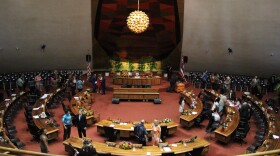Last year, legislators took a crack at raising teacher salaries, funding classroom improvements and expanding pre-K accessibility — yet many advocates are saying more needs to be done this session.
"Recruitment and retention is always something that we're wanting to get addressed in the legislative sessions," said Osa Tui, Jr., president of the Hawaiʻi State Teachers Association.
"Although we had successes last legislative session, we still continue to see that resignations are up last year," said Tui. "Although retirements are down, people are still leaving the profession, and they're also leaving because of workplace conditions.
He said that teachers are stressed, burnt out, and have "too many things being put onto their plates."
According to the state Department of Education, 920 teachers resigned last school year, which is more than 100 more teachers compared to the previous school year. Almost half of the resignations resulted in teachers leaving the state.
Affordable housing will also continue to pose as a goal for lawmakers this session. House Education chair Rep. Justin Woodson of Maui tells HPR proposals for teacher housing continue to gain support.
"That's something that we can do as a legislative body that helps address that specific issue of teacher recruitment and/or teacher retention," Woodson said.
"It's something that can help with teachers — in particular cost of living — and that would be attractive for an educator or someone looking at going into the field of education."
Another focus for HSTA and Woodson is re-evaluating how additional state funds get to public schools.
The state Department of Education currently uses a formula that allocates a certain amount of funds per student. The money is distributed from the department to complex areas and then to the school. Any additional funds the DOE receives from the legislature follow the same process.
Woodson said it's time for lawmakers to re-evaluate how these funds are distributed — especially for rural and charter schools.
"Our rural schools continue to struggle, because of a lack of funding," he said. "Which leads to a lack of programming, which leads to less support for teachers, which leads to potentially less outcomes for our kids."
Additionally, Rep. Jeanné Kapela of Hawaiʻi Island wants to prioritize moving away from standardized tests. She said the goal is to administer authentic assessments. This type of assessment evaluates how students use classroom education and apply it to real-world scenarios in the form of projects.
"We have incredible examples of this in my own district Kaʻū with their ʻāina-based program," said Kapela.
Another priority for Kapela is making post-secondary education more available to high school graduates. She proposes making community colleges free for Hawaiʻi residents.
"I think that our community colleges are underutilized. And I think that they're also this really great pathway to access higher education," she said.
Kapela acknowledges that higher education isn't for everyone, but the proposal's purpose is to break down barriers that may prevent graduates from continuing their education.
"There are a lot of students who count themselves out of college because they feel like they could never afford it. Why start the process if you feel like you could never get there?"
State lawmakers enter the session with a $2 billion surplus. Kapela said it would cost less than $20 million to make community colleges free for students.
"If we know it's less than $20 million, and we have a $2 billion surplus, we need to invest that money into our communities," said Kapela.
"Education is the one thing that so many politicians talk about during an election cycle. And this is our time to put our money where our mouth is."
Kapela acknowledges the budget surplus is only temporary. She tells HPR she plans to introduce measures that general revenue to sustain her goal of free tuition for community colleges.
Meanwhile, the DOE is focusing on obtaining more funds to support school-level needs. This year is the start of the next biennium, meaning departments have to present budgets and goals to lawmakers for the next two years. Deputy superintendent of strategy Tammi Chun said the department is requesting $186 million in the first year and $213 million in the second year.
The funds will help the department address its top priority, which is to continue support for student health and safety initiatives, as well as other efforts at the school level.
"Support for our Hawaiʻi keiki nurses, so that students have access to nurses at the school. We also have our request for additional social workers and school psychologists to provide some additional support," Chun said.
According to Chun, the DOE is also asking for additional support to continue telehealth services for students and families.
Chun said the DOE is also asking for additional money for capital improvement projects — in order to update facilities to be more energy efficient.
Other measures that will be introduced include initiatives to combat sex trafficking at schools, making community colleges free for high school graduates and expanding public pre-K education.







